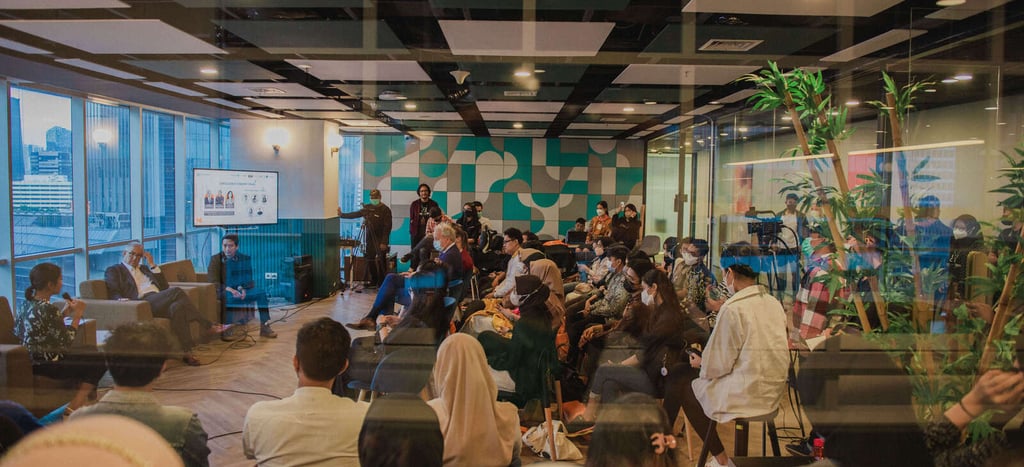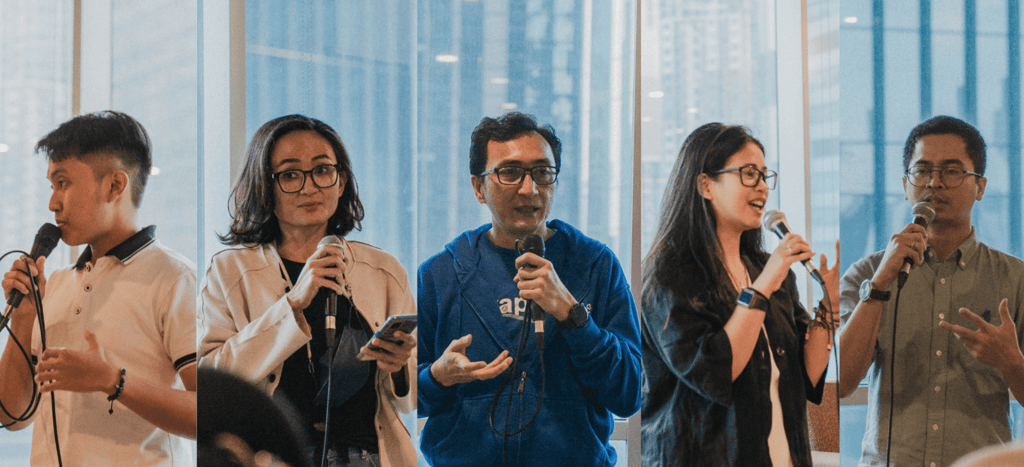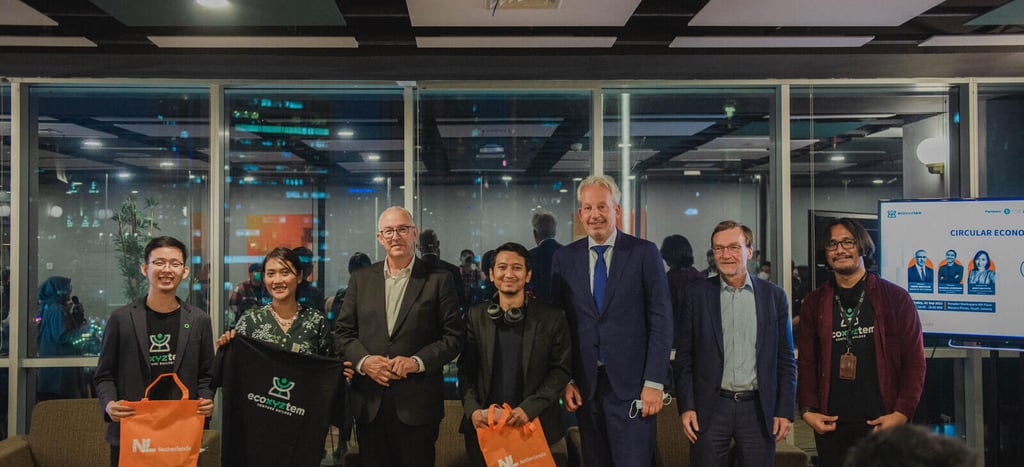Tale of Two Cities in Achieving Sustainability: Jakarta - Rotterdam Circular Economy Talk
What is circular economy? How does Rotterdam implement it, and can Jakarta follow the footsteps?
PRESS RELEASEEVENT


Circular Economy Talk
The Netherlands Embassy in Indonesia, in collaboration with Ecoxyztem hosted "Jakarta-Rotterdam Circular Economy Talk '' to gather varying insights and share best practices between Jakarta and Rotterdam in creating solutions toward achieving a circular economy.
This talk also aims to provide a platform for ecopreneurs (startup, corporate, circular changemaker) to explore collaboration for a circular economy, as well as to educate and spread awareness to have better solutions in achieving a more sustainable future.
What is a circular economy from the changemakers perspective?
The "Stand Up for Sustainability" session features 5 circular changemakers presenting their take on the topic. They share their personal concerns and hopes for the future of sustainability, while also introducing how their brands have been involved in the circular economy.
Aldino Dwi Anugerah explains how QYOS is aiming to help facilitate people in reusing their potential waste, while also touching on how all green startups need to collaborate in this economy.
Bunga Sirait from Paprika Living as representative of green media, conveyed her hopes that circular economy wouldn't be another jargon used by brands to do greenwashing.
Berthy Erydani Benta Nuas of Rapel underlines the importance of environmental education since schooling age, which then will lead to a whole nation turning into a more sustainable country.
Rachel Natasia talks how Amandina Bumi Nusantara supports recycling of plastic, and how the circular economy provides a source of living for waste pickers in cities.
Handhyanto Hardian of Robries describes how brands can try to prevent the waste from their own by processing them to more useful form.
To sum up, our speakers agree that the implementation of a circular economy will require collaboration between all elements in society. Everyone would need to work together in executing 5R, which is the key to what circular economy is: rethink, reduce, reuse, recycle, and repair.
How should a city implement a circular economy?
From the talkshow session between Ahmed Aboutaleb (Mayor of Rotterdam) and Bijaksana Junerosano (Founder of Greeneration Group) which was moderated by Adhityani Putri (Founder of Yayasan Indonesia CERAH), we gather 3 crucial points to move the needle in implementing a circular economy on a large scale: policy, finance, and space.
Policy
“One of the examples to enforce innovation is to create an urgency by setting a date. But if you do that, you need to put your money where your mouth is. So you have to facilitate that process by legislation to enforce that, so that the industry has an incentive to know that a date is there, and we need to move fast to meet the criteria. That is an example of productivity driven by a date.” - Ahmed Aboutaleb (Mayor of Rotterdam)
Compares to the progress of Rotterdam, Mr. Junerosano compares how Indonesia has set many laws and deadlines, but hasn't filled the missing gap which are the intention, the innovation, and also the resources or the finance.
Finance
Mr. Aboutaleb explains how taxation is the backbone of policy implementation. Taxation is very important because one of the roles of government is redistribution, bringing the money from the well income to where it's most needed.
On a similar note, Ms. Adhityani Putri conveys that based on a nationwide survey of 17-35 year olds most are willing to get involved by donating up to Rp30.000 per month to help solve the waste problem. So sustainable waste management is a top of mind issue.
Mr. Aboutaleb then further challenged the audience to demand the government after elections to set a 1% from the national budget towards youth and innovation, which is a good starting point.
Space
A clear example from Mr. Aboutaleb is the Port of Rotterdam, a space created for innovators and innovation to prosper. Not only should the government support innovators, Mr. Aboutaleb also explains extensively how it is the mayor's due diligence to raise and implement policy with the citizen's direct involvement.
Along this message, Mr. Junerosano reiterates how currently the speed of destruction is still faster compared to the speed of solution. So from the perspective of innovation, the youth themselves currently have a lot of green startup ideation, a lot of energy and intention. It is crucial now for the government to respond equally.
If we want to link back to the crucial point of policy, youth has also a big potential in pushing the government agenda. As Mr. Junerosano puts it:
“If you can create a noise and voice about what do we want, what the president should do, what the mayor or the governor should do, it will create noise. So for me, gathering youth like this is political action. What we do is we are creating a space where we can know someone who has similar mind, similar passion, and similar vision to do something, and create a louder message, a stronger impact if we do collaboration.” - Bijaksana Junerosano (Founder of Greeneration Group)
Conclusion
“Remember we are a young country, and there's actually 80 million of us who are Gen Z and Millenials so that's quite significant. We can change the political landscape and if we get loud enough we can draw attention to anything that we want especially on circularity.” - Adhityani Putri (Founder of Yayasan Indonesia CERAH)
Let's get involved in creating a more circular economy for a better future!




Stand Up for Sustainability Speakers
Left to Right: Aldino Dwi Anugerah, Bunga Sirait, Berthy Erydani, Rachel Natasia and Handhyanto Hardian
Ecoxyztem Venture Builder x Embassy of the Kingdom of the Netherlands
